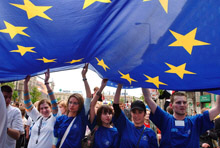
Typical street scene in Santa Ana, El Salvador. (Photo: iStock)
IMF Survey: Crisis Creates Testing Times for Europe’s Policymakers
June 10, 2009
- Economic contraction is big challenge for European Union
- Euro has been beacon of stability for its 16 member countries
- Emerging Europe must adapt to postcrisis world of much lower capital flows
The economic downturn sparked by the financial crisis that began in mid-2007 has become a global, synchronized recession.

Recession-hit Europe faces risk that recovery might be delayed if policymakers do not address financial sector problems head on (photo: Alik Keplicz/AP)
GLOBAL ECONOMIC CRISIS
Tighter financial conditions, falling wealth, and greater uncertainty have triggered a sharp decline in all types of demand. In parallel with the rest of the world, Europe has entered a deep recession, and there is a risk that the recovery will be delayed, especially if policymakers do not address problems in the financial sector head on.
The IMF’s most recent forecast for 2009 sees a sharp economic contraction in advanced Europe. In Emerging Europe, output is also projected to fall steeply. Several countries in central and eastern Europe, including Belarus, Hungary, Latvia, and Ukraine, are in deep crisis and have requested financial assistance from the IMF, the European Union, the World Bank, and other partners.
Harsh toll
The June 2009 issue of the IMF’s quarterly magazine Finance & Development looks at the harsh toll of the crisis on both Europe’s advanced and emerging economies because of the global nature of the shocks that have hit both the financial sector and the real economy, and because of Europe’s strong regional and global trade links. The elections for the European Parliament, which ended June 8, highlighted the diverse points of view among the 27 members of the European Union on some of the big challenges facing Europe.
Marek Belka, Director of the IMF’s European Department, writes in the lead article that beyond the immediate need for crisis management, Europe must revisit the frameworks on which the European Union is based because many have been found wanting. Most pressing is the need to overhaul the European Union’s financial stability framework.
The crisis is also testing the new central and eastern European members of the European Union. But in many respects, one key European institution has proved its mettle—the euro. Both Charles Wyplosz and Barry Eichengreen discuss the future of the common currency.
Key articles include:
Europe Under Stress
Marek Belka
The integration of Europe’s economies has been a tremendous success story. This success could now be at risk. The trick is to manage the crisis, preserve the progress that has been made, and revamp Europe’s frameworks and reform agenda.
Losing Their Halo
Martin Čihák and Srobona Mitra
The new central and eastern European members of the European Union had it very good for a while. But the good times didn’t last. The new member states’ initial resilience to the global financial turmoil has given way to deep crisis in a few of them.
A Tale of Two Crises
Erik Berglöf, Alexander Plekhanov, and Alan Rousso
Russia has not done enough to inoculate itself from recurring crises that stem, in large part, from a sharp drop in the price of oil.
Stress Test for the Euro
Barry Eichengreen
The ongoing credit crisis has given rise to chatter and speculation about the possibility that one or more euro area countries might now choose to abandon the euro. This article weighs the implications of such a move and concludes that it is not inconceivable.
The Euro’s Finest Hour?
Charles Wyplosz
The financial—and now economic—crisis has presented the euro area with a large number of varied tests. But one thing these countries don’t need to worry about is their currencies, because they don’t have any. The euro works and that is no mean feat.
Comments on this article should be sent to imfsurvey@imf.org


